
The White-Slave Traffic Act, also called the Mann Act, is a United States federal law, passed June 25, 1910. It is named after Congressman James Robert Mann of Illinois.

Barings Bank was a British merchant bank based in London, and one of England's oldest merchant banks after Berenberg Bank, Barings' close collaborator and German representative. It was founded in 1762 by Francis Baring, a British-born member of the German-British Baring family of merchants and bankers.
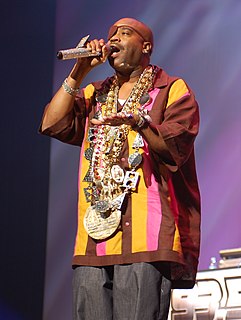
Richard Martin Lloyd Walters, better known as Slick Rick, is an English-American rapper and record producer.

Alexander Baring, 1st Baron Ashburton, PC, of The Grange in Hampshire, of Ashburton in Devon and of Buckenham Tofts near Thetford in Norfolk, was a British politician and financier, and a member of the Baring family. Baring was the second son of Sir Francis Baring, 1st Baronet, and of Harriet, daughter of William Herring.

"Children of the plantation" was a euphemism used during the time of slavery in the United States, to identify the offspring born to black female slaves and white men, usually the slave's owner, one of the owner's relatives, or the plantation overseer. Rape of female slaves occurred on many plantations. These children were born into slavery, through a legal doctrine known as partus sequitur ventrem. They were classified as mulattoes, a former term for a multiracial person. The one drop rule meant that they could never be part of white society. Some of the fathers treated these children well, sometimes providing educational or career opportunities, or manumitting (freeing) them. Examples are Archibald and Francis Grimké, and Thomas Jefferson's children by Sally Hemings. Others treated their multiracial children as property; Alexander Scott Withers, for instance, sold two of his children to slave traders, where they were sold again.
Liberation or liberate may refer to:

François Mackandal (c.1730-c.1758) was a Haitian Maroon leader in Haiti. He is sometimes described as a Haitian vodou priest, or houngan. For joining Maroons to kill slave owners in Saint Domingue, he was captured and burned alive by French colonial authorities.
The Crittenden Compromise was an unsuccessful proposal to permanently enshrine slavery in the United States Constitution, and thereby make it unconstitutional for future congresses to end slavery. It was introduced by United States Senator John J. Crittenden on December 18, 1860. It aimed to resolve the secession crisis of 1860–1861 that eventually led to the American Civil War by addressing the fears and grievances of Southern pro-slavery factions, and by quashing anti-slavery activities. The Crittenden Compromise is not to be confused with the Crittenden Resolution, which provided that the Union would take no actions against slavery.
Francis Anthony Boyle is a human rights lawyer and professor of international law at the University of Illinois College of Law. He has served as counsel for Bosnia and Herzegovina and has supported the rights of Palestinians and indigenous peoples.
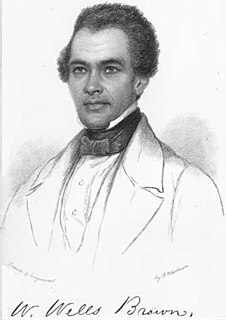
William Wells Brown was a prominent abolitionist lecturer, novelist, playwright, and historian in the United States. Born into slavery in Montgomery County, Kentucky, near the town of Mount Sterling, Brown escaped to Ohio in 1834 at the age of 19. He settled in Boston, Massachusetts, where he worked for abolitionist causes and became a prolific writer. While working for abolition, Brown also supported causes including: temperance, women's suffrage, pacifism, prison reform, and an anti-tobacco movement. His novel Clotel (1853), considered the first novel written by an African American, was published in London, England, where he resided at the time; it was later published in the United States.

A galley slave was a slave rowing in a galley, either a convicted criminal sentenced to work at the oar, or a kind of human chattel, often a prisoner of war, assigned to the duty of rowing.
In comics, an ongoing series is a series that runs indefinitely. This is in contrast to limited series, a one shot, a graphic novel, or a trade paperback. However, a series of graphic novels may be considered ongoing as well. The term may also informally refer to a current or incomplete limited series with a predetermined number of issues.

Edward James Slattery is an American prelate of the Roman Catholic Church who served as bishop of the Diocese of Tulsa in Oklahoma from 1993 to 2016.
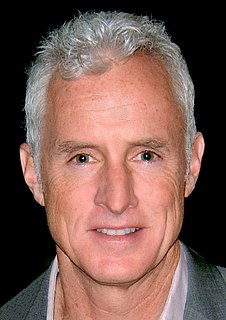
John M. Slattery Jr. is an American actor and director widely known for his role as Roger Sterling Jr. in the AMC drama series Mad Men (2007–15), for which he was nominated four times for the Primetime Emmy Award for Outstanding Supporting Actor in a Drama Series.
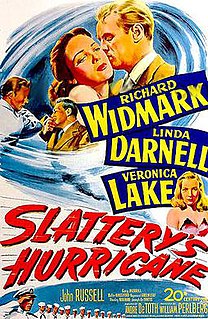
Slattery's Hurricane is a 1949 American drama film directed by Andre DeToth and starring Richard Widmark, Linda Darnell and Veronica Lake. It is based on a story submitted by Herman Wouk, who also coauthored the screenplay and published a novel of the film in 1956.
Slattery is a surname of Irish origin. The name is an anglicisation of the Irish: Ó Slatara or Ó Slatraigh, meaning 'descendant of slatra' meaning 'robust', 'strong', 'bold'. The name originated in the townland of Ballyslattery in the barony of Tulla Upper in east County Clare, Ireland.
"Ender's Game" is a science fiction novelette by American writer Orson Scott Card. It first appeared in the August 1977 issue of Analog magazine and was later expanded into the 1985 novel Ender's Game. Although the foundation of the Ender's Game series, the novelette is not properly part of the Ender's Game universe, as there are many discrepancies in continuity.
Igbo Americans, or Americans of Igbo ancestry, are residents of the United States who identify as having Igbo ancestry from modern day Nigeria. There are primarily two classes of people with Igbo ancestry in the United States, those whose ancestors were taken from Igboland as a result of the transatlantic slave trade before the 20th century and those who immigrated from the 20th century onwards partly as a result of the Nigerian Civil War in the late 1960s and economic instability in Nigeria. Igbo people prior to the American Civil War were brought to the United States by force from their hinterland homes on the Bight of Biafra and shipped by Europeans to North America between the 17th and 19th centuries.
Brian Francis Slattery is an American writer and an editor at The New Haven Review. He has published three novels, Spaceman Blues: A Love Song, Liberation: Being the Adventures of the Slick Six After the Collapse of the United States of America, and Lost Everything.
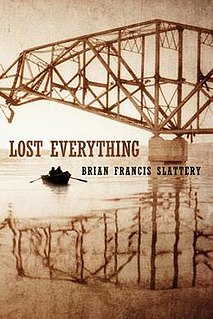
Lost Everything is an apocalyptic science fiction novel by Brian Francis Slattery, published in 2012 by Tor Books. The novel received the 2012 Philip K. Dick Award.










